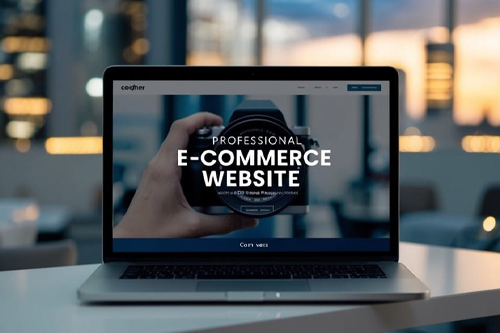
A customised eCommerce Website can help a business and increase ROI as you through your e-commerce Website get a much wider customer reach across the world. An eCommerce Website enables your business to remain open 24/7 worldwide. Whether it is a Sunday or a national holiday, your eCommerce online store always remains open. It does not matter how popular your brand in a city, if your reach is low, your profits will also be low. An eCommerce Website helps you increase the conversion rate as the customers can see the product and buy it online. An eCommerce online store is also easier to setup, run, and maintain than a physical store.

| Factor | Custom E-commerce Development | SaaS (Hosted) E-commerce Platforms |
|---|---|---|
| Ownership | Full ownership of code, hosting, and data. | Limited – platform controls hosting & core system. |
| Design | Fully unique, no template restrictions, can match exact brand identity. | Template-based, limited design freedom (customization possible only within framework). |
| Customization | Unlimited – any feature can be developed (CRM, ERP, AI tools, marketplace). | Limited – can only add what platform allows via apps/plugins. |
| Scalability | High – can handle millions of products & traffic with custom architecture. | Medium to high – scalable but depends on subscription plan (e.g., Shopify Plus for enterprise). |
| Cost Structure | One-time high development cost + hosting + maintenance. | Low entry cost but ongoing monthly subscription + transaction fees. |
| Time to Launch | Longer (weeks to months depending on complexity). | Very fast (hours to a few days). |
| Maintenance | You/your team must manage updates, bug fixes, hosting, and security. | All updates, security patches, and hosting handled by the provider. |
| Security | Customizable (firewalls, encryption, compliance as per business needs). | Provider-managed (PCI compliance, SSL, server protection included). |
| Payment Gateway | Any gateway can be integrated (local or international). | Limited to available gateways (e.g., Shopify has its own + supported ones). |
| SEO & Marketing | Fully SEO-optimized with custom strategies, deep control over technical SEO. | SEO features are limited (meta tags, basic controls). Advanced SEO sometimes restricted. |
| Integrations | Free to connect with any 3rd party (ERP, POS, logistics, APIs). | Integration limited to app marketplace of provider. |
| Data Control | 100% control of customer & sales data. | Platform stores the data – limited portability if you switch providers. |
| Speed & Performance | Fully optimized for your hosting/server setup. | Optimized by provider, but shared infrastructure may have limits. |
| Analytics & Reporting | Fully customizable reports, dashboards as per business KPIs. | Standard reporting tools, can be extended via apps. |
| Multi-language & Multi-currency | Full flexibility – add as per business need. | Available but with restrictions (advanced options may cost extra). |
| Support | Depends on your developer/agency team. | 24/7 support from SaaS provider. |
| Future Proofing | Fully adaptable to new tech (AR/VR shopping, AI recommendations, blockchain, etc.). | Limited to features that provider decides to roll out. |
Which One to Choose?